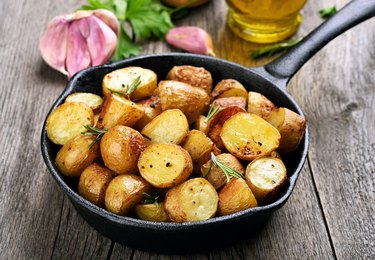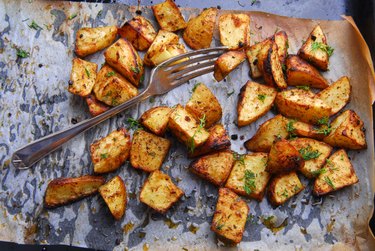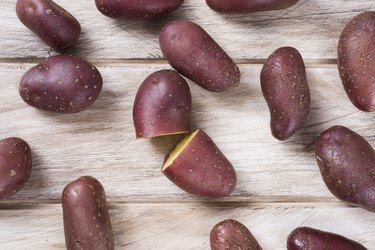
All potatoes are carbohydrate-rich, but not all spuds are the same. Just like they vary in size, shape, color, texture and flavor, they're also nutritionally different. Two of the most common potato varieties are Russet and Yukon Gold potatoes.
Russet potatoes have thick brown skins and are known as high-starch potatoes while Yukon Gold potatoes have thin, light yellow skins and are medium- to low-starch.
Video of the Day
Video of the Day
While they can both be baked, fried, boiled and mashed, Yukon Gold potatoes' low starch content helps them keep their shape better when boiled — and they have a buttery smooth texture.
While both potatoes are starchy vegetables that are regularly spotted at the dinner table, they have quite a few differences when it comes to their nutrition profile.
Russet vs. Yukon Gold Potato Nutrition Facts
Per medium baked potato (173 g) | ||
|---|---|---|
Calories | 130 | 164 |
Carbohydrates | 30.9 g | 37.1 g |
Fiber | 2.5 g | 4 g |
Sugar | 1.2 g | 1.9 g |
Fat | 0 g | 0.2 g |
Protein | 3.6 g | 4.5 g |
Vitamin C | 36% Daily Value (DV) | 16% DV |
Potassium | 16% DV | 20% DV |
Vitamin B6 | 14% DV | 36% DV |
Iron | 7% DV | 10% DV |
Magnesium | 7% DV | 12% DV |
Calories
Yukon gold potatoes have slightly fewer calories per serving thanks to the lower carbohydrate content. The equivalent of a medium baked potato (173 grams) of Yukon Gold has 130 calories versus the 164 calories found in the same amount of a Russet potato.
Both are relatively low in calories, making up only 6 percent (Yukon Gold) and 8 percent (Russet) of a 2,000-calorie diet.
Carbohydrates
As with many other vegetables, most of the calories in Russet and Yukon Gold potatoes come from carbohydrates. What makes potatoes different from vegetables like carrots or broccoli is that they're a starchy vegetable rich in carbs, along with corn, peas and squash.
Starch is a complex carbohydrate that's found in plants like vegetables, beans, lentils, fruit and grains, per the Mayo Clinic. Russet potatoes are starchier than Yukon Gold, which is why they're higher in carbohydrates by 6.2 grams.
Carbohydrates are your body's primary fuel source, so carbohydrate-rich foods such as Russet or Yukon Gold potatoes give your body energy to fuel daily life and exercise.
Fiber
While the primary type of carbohydrate in Russet and Yukon Gold potatoes is starch, they also have fiber, a type of carb that's undigestable in the body but has significant health benefits. Fiber helps to regulate hunger, blood sugar, cholesterol levels and digestive health, per the Harvard T.H. Chan School of Public Health.
One medium Russet potato with the skin has 4 grams of fiber, while the same size Yukon Gold has 2.5 grams. The USDA recommends getting at least 14 grams of fiber per 1,000 calories you eat per day (that checks out to 28 grams per day for a 2,000-calorie diet).
Protein
While potatoes are not a significant protein source, they do add a small amount to your diet. One medium Russet potato has 4.5 grams of protein, while the same amount of Yukon Gold has 3.6 grams. When paired with other plant or animal protein sources, potatoes can help you reach your protein goals.
The recommended daily allowance to avoid protein deficiency for a sedentary adult is 0.8 grams per kilogram of body weight, per the Mayo Clinic. Many people need more than this depending on activity level, age and medical conditions.
Fat
Russet and Yukon Gold potatoes may be appropriate for low-fat diets, as both potatoes are virtually fat-free with less than 0.2 grams per serving. While potatoes themselves are low-fat, your toppings may not be. Popular baked potato toppings include sour cream, butter, cheese and bacon — all high-fat foods.
Vitamins and Minerals
Potatoes are a rich source of potassium, but that's not the only micronutrient they're high in. Both Russet and Yukon Gold potatoes are sources of iron, magnesium, vitamin C and vitamin B6.
One medium baked Russet potato has 20 percent of your daily value for potassium. Yukon Gold provides just a little less with 16 percent. Potassium helps your muscles, nervous system and heart function properly and also helps regulate fluid shifts in and out of cells, per the Harvard T.H. Chan School of Public Health.
Russet potatoes are slightly higher in potassium, iron and magnesium than Yukon Golds. They also have 22 percent more vitamin B6. This vitamin is needed for brain development and immune health, per the National Institutes of Health (NIH).
When it comes to vitamin C, one serving of Yukon Gold potatoes has 36 percent of your daily value and 20 percent more than russet potatoes. Vitamin C is famous for its role in immune health, but it's also an important antioxidant, iron absorption ally and essential for skin health and wound healing, according to the NIH.
- USDA: "Russet Potato"
- USDA: "Yukon Gold"
- Mayo Clinic: "Carbohydrates: How carbs fit into a healthy diet"
- Harvard T.H Chan School of Public Health: "Fiber"
- USDA: "How much Dietary Fiber Should I eat?"
- Mayo Clinic: "Are You Getting Too Much Protein?"
- NIH: "Vitamin B6"
- NIH: "Vitamin C"
- Harvard T.H Chan School of Public Health: "Potassium"
- University of Maryland Medical Center; Potassium; May 2009


